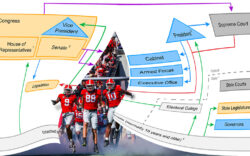We have just published online the last of 120 articles that Donald E. Wilkes Jr. has written in Flagpole over the years, mostly online at flagpole.com. “Eugene” sent in this piece just as he was leaving town week before last for a trip to Washington state, where he died suddenly from an apparent heart attack.
I worked closely with Eugene throughout the years, at Flagpole and at the Athens Observer before that. We saw each other from time to time, but mainly ours was a collaboration by email and by telephone.
Eugene was a distinguished professor in the UGA School of Law who published an unbelievable number of scholarly books, articles and reviews, yet he never tried to pull rank on me. He was obsessive in his determination to get each piece right and to root out any errors—factual or typographical—that might creep in. He would turn in a piece, and then I would get a flurry of phone calls and emails, pointing my attention to mistakes he had found. These messages would continue even after the piece was published, and since, especially in later years, they were published only online, I could still go in and make corrections.
Eugene’s articles were much too long for Flagpole’s weekly paper, and there were times in the past when I cut them severely to make them fit. He finally came to the conclusion that he was writing for a wider audience than just our local readers, and that he would rather have the whole thing online only, rather than an abbreviated version in the paper.
From the intense but limited contact I had with Eugene over the years, I came to know him as a fierce defender of those oppressed by power, though in person he was kind, gentle and unassuming. I don’t know how he taught a full load at the law school for 40 years, published all those scholarly books and articles, maintained his home life and still had all that energy to throw into his Flagpole pieces.
After I got out of the Athens Observer, Eugene continued to publish his articles there, and one or two in the Athens Banner-Herald, while keeping up his prolific scholarly writing.
A couple of years after I signed on with Flagpole, the Edward Wright incident occurred, in which a mentally disturbed black man was running naked in East Athens and was killed by police officers. That terrible shooting upset the community, especially after the officers were cleared of any wrongdoing. That was more than Eugene Wilkes could stand, and he wrote several articles in Flagpole questioning what he saw as a police cover-up. Since that time in 1996, Eugene continued until his death, in Flagpole as elsewhere, to question those in authority on a variety of subjects. He has consistently opposed the use by police of taser shock-weapons and had for a number of years published a listing of every death in this country by police tasering.
By far, though, Eugene’s longest-running preoccupation was the assasination of President John F. Kennedy on Nov. 22, 1963. For the last 20 years, Eugene wrote at least an annual column, generally reviewing books that questioned the official account of Kennedy’s death. Some of the younger Flagpole staff used to wonder why we continued publishing these pieces about a president they didn’t remember, but Eugene remembered, and he believed until his dying day that Kennedy was killed by never-exposed conspirators who framed Lee Harvey Oswald.
Donald Eugene Wilkes Jr. gave his life to the pursuit of justice for those least likely to get it. He was a distinguished professor of the law, but he widened his reach through publications likeFlagpole, and he was a perennial speaker at the Athens Human Rights Festival and anywhere else where two or three were gathered together in the name of justice.
It is fitting that Eugene’s last publication in Flagpole online is his review of a new book questioning the official version of Robert Kennedy’s assassination in 1968. Eugene knew, through his own studies and experiences, that powerful people and powerful governments can commit crimes and cover them up, and no one dare question them.
Eugene always dared to question, and he marshaled his facts with his shrewd legal mind and his obsessive determination that the truth be told. He leaves us fortified by those truths, but wondering if anyone can ever take his place.
Like what you just read? Support Flagpole by making a donation today. Every dollar you give helps fund our ongoing mission to provide Athens with quality, independent journalism.










